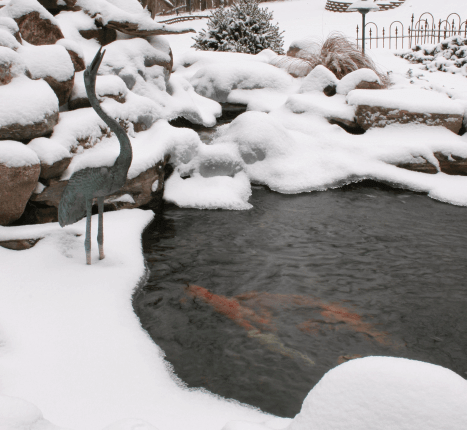Winter Pond Fish Care
How do I care for my pond fish in winter? Do they hibernate during the winter? They’re not moving very much, are they ok? These are a few of the questions we get from Pond owners during the Winter season. Here are some answers to those questions, and some other tips on Winter Pond Fish Care.
Metabolism
Koi and Goldfish are cold blooded, which means their body temperature fluctuates with the water temperature. So during the Winter, their body temperature drops as the water cools. They don’t truly hibernate, as the temperature drops, their metabolism slows down to preserve energy. This is why they don’t seem to be moving very much. This is one of the main reasons it is important to stop feeding your fish when the water gets much below 50 degrees. With a slowed metabolism, the fish are unable to properly digest the food.
Gas Exchange
Gas exchange is very important during the winter months, especially if a pond freezes over for more than a couple days. If you don’t have adequate gas exchange, carbon dioxide will build up and oxygen levels will decrease. Either one of those conditions if bad enough can cause fish to die. There are several good ways to keep a hole in the ice. Firstly you can put a pump below the surface pointing up and the moving water won’t freeze. You can also use an aerator, which in addition to keeping an ice free area increases oxygen levels in the water. There are a multitude of de-icers on the market whose purpose is not to heat the pond but maintain and open ice free area. Other methods include using boiling water to melt a hole & floating a ball that can be removed leaving a hole. Do Not Break The Ice! Pressure from striking the ice can harm your fish, as well as forcing them to be active when they shouldn’t be.
Super-cooling
When it’s really cold, running a water fall can have a super-cooling effect on the pond and drive the temperatures even lower. This happens because the water from the falls passes through the cold air and because it’s a thin sheet of water it cools down faster. In winters with prolonged very cold temperatures, it can be safer to turn off the falls and use an aerator, submerged pump or de-icer to help with circulation and aeration.
In the end, it’s most important to provide the best environment and least stress on your pond fish (and yourself). Let them gradually cool down into Winter and then warm back up in the Spring. Click the following link to read about Feeding Pond Fish In Winter!

